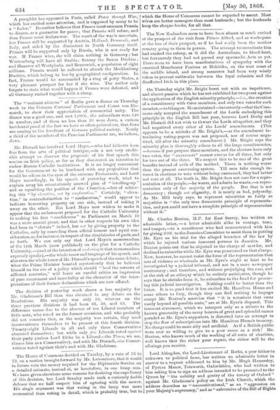Mr. Disraeli has involved Lord Mayo,—who had hitherto been free
from the arts of political intrigue,—in a not very credit- able attempt to disavow the proposals of his first speech this session on Irish policy, so far as they discovered an intention to endow Roman Catholic institutions. It is no longer convenient for the Government to be burdened with any proiositioa that would be odious in the eyes of the extreme Protestants, and Lord Mayo accordingly, in his speech of yesterday week, tried to explain away his ostentatiously avowed plan of " levelling-up " and so equalizing the position of the Churches,—but of achiev- ing this "by elevation, not by confiscation." Certainly, " eleva- tion," in contradistinction to "confiscation," would appear to indicate bestowing property on one side, instead of taking it away on the other. But Lord Mayo now wishes to make it appear that the endowment proposed for the Catholic University in making his first " confidences " to Parliament on March 10 was a mere annual grant, and that in other respects his own idea had been to " elevate " indeed, but not by giving property to the • Catholics, only by conceding them official honour and equal con- sideration, as, for instance, in respect of the chaplaincies of gaols, and so forth. We can only say that Lord Mayo's memorandum of the 14th March (now published) on the plan for a Catholic University,—(and of the intention of endowing it that memorandum expressly speaks),—the whole tenor and language of his speech, and also even the whole tenor of Mr. Disraeli's speech of the same debate, when the Prime Minister boasted mysteriously that he believed himself on the eve of a policy which should "heal the sorrows of afflicted centuries," will leave on careful critics an impression of pure amazement and incredulity at the character of the inter- pretations of their former declarations which are now offered.






























 Previous page
Previous page